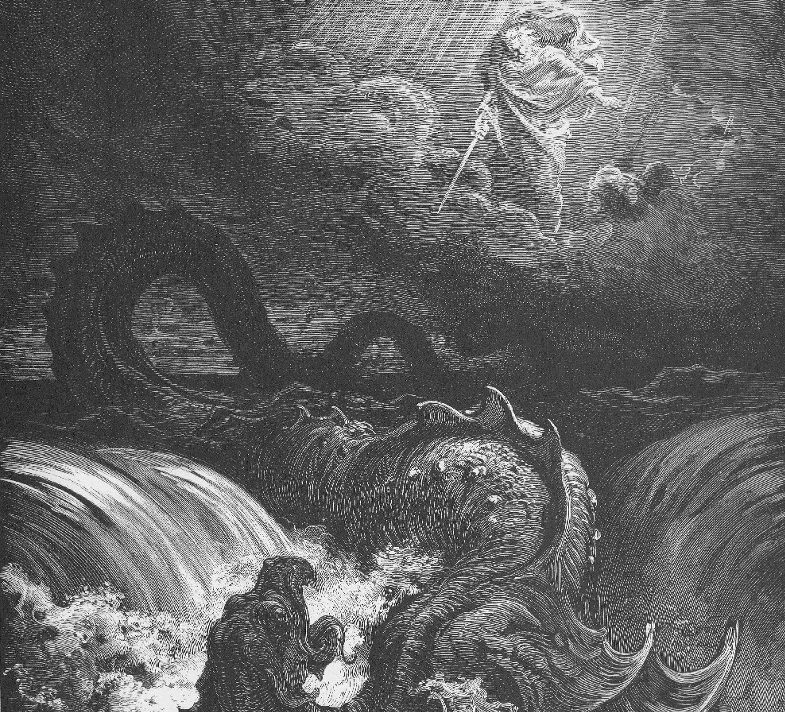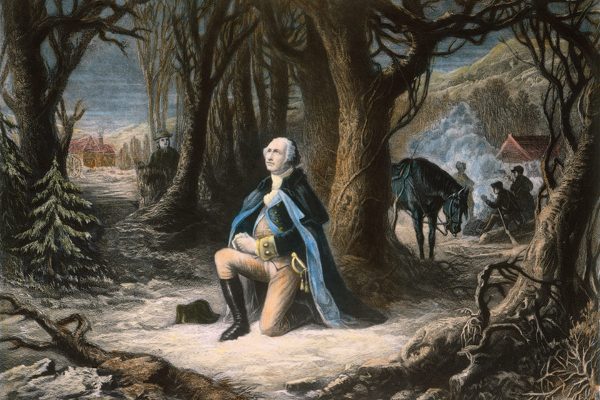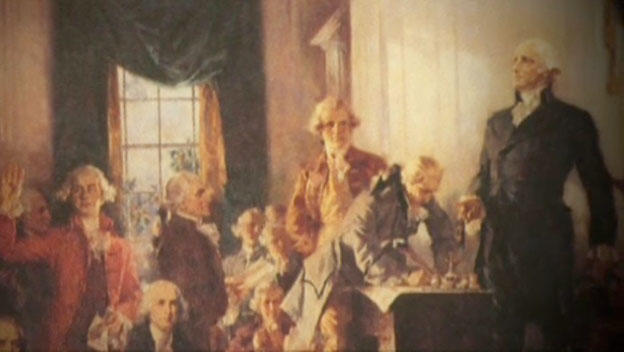Digital conditions, not competing intellectuals, will make it so.
Nobody Expects the Originalist Inquisition

"Real Originalism has never been tried..."
The responses to my first article on Originalism have been as entertaining as they have been instructive. On Twitter, I was told that because I did not understand originalism my criticism failed to reach its mark. But of course, this presupposes there is an originalism to understand.
In the classic story of the Emperor’s New Clothes, the emperor’s ministers strive to outdo each other in describing the splendid attributes of the ruler’s invisible clothes. The last week on Twitter has been like this.
No True Originalist…
Several advocates of Originalism continue to expound the grandeur of a theory that they admit is (1) claimed by false prophets; and (2) not followed by its chief prophets. But orthodoxy demands we accept Originalism in some form, apparently. And so the inquisitorial agents are out in full force to question the heretics. This is because Originalism has become the shorthand way to say you are a real conservative.
But as the various “schools” of Originalism demonstrate, this is ultimately a pro forma act. Everyone says they are an originalist and then is forced to explain their “school” of Originalism, i.e., what their real judicial philosophy is. It has become the modern conservative’s version of burning incense before Caesar.
At this point, I am sure I will be met with the objection that just because self-identified proponents of Originalism cannot agree on what Originalism is or apply it consistently does not mean Originalism itself is untrue. Of course, to make this argument is to admit that the main complaint by originalists against a natural understanding of law—that the presence of disagreement proves it is false—is a canard. The alleged advantage of Originalism—a fixed, stable understanding of law—is exposed as an illusion.
This is not to say that most self-described originalists are doing it out of self-interest or without sincerity. The rhetorical and emotional pull of Originalism has always been that it produces a feeling of closeness to the founders and the founding. But this raises a deeper and more important question: what is appealing about saying you are an originalist?
Founding Positivism
Do we seek to adhere to the founding because it is the founding of the nation? Or do we want to adhere to the founding because it is good? As an emotional matter, I imagine that most originalists earnestly feel the latter. But Originalism, by its own terms and according to its most vocal advocates, screens out and prohibits an examination of whether the founding was good or just—rather, it just is. Indeed, that is the ideal. What else can explain so many advocates of Originalism arguing that a common-good jurisprudence is contrary to Originalism?
In effect, this is legal realism under a different guise. Whereas for most realists the law simply is what judges do, for originalists the law simply is what the founders did. Rather than providing a moral foundation for the Constitution, this approach merely presents the historic meanings of words without explaining what is good about those understandings or constitutional provisions. The ideal opinion is one which offers no more justification for the result than that it is what the historical meaning of the text demands.
By refusing to provide a reason why it is good to follow the original meaning of the Constitution, conservatives are failing to explain the moral basis for the American republic. This approach to interpreting the Constitution is closer to that of H.L.A Hart than that of James Wilson. Thus, ironically, Originalism has more in common with modern theories of law than the furnishings of mind found among the founding generation.
Declaration Nullification
A classic example of this phenomenon is Justice Scalia’s admission, in his dissent to the Troxel v. Granville (2000) decision, that the Declaration affirms the right of parents to raise their children, that this right is incorporated in the Ninth Amendment, and that various Supreme Court cases vindicate it—but then concluding that the judicial function prevents vindicating it because, since the Constitution “does not even mention” parental rights, to enforce them would require “a judicially crafted definition of parents.”
But of course, lack of explicit mention in the Constitution did not prevent Scalia’s application of judicially-crafted definitions of state-sovereign immunity, selective judicial incorporation, plenary doctrine of immigration, separation of powers, standing, the limitation on Congress’s authority to enforce the 14th Amendment under Section 5, and many others.
For example, Justice Scalia explained in College Savings Bank v. Florida Prepaid (1999) that “though its precise terms bar only federal jurisdiction over suits brought against one State by citizens of another State or foreign state, we have long recognized that the Eleventh Amendment accomplished much more.” And in his dissent in Williams-Yulee v. Florida Bar (2015), as Hadley Arkes has mentioned in these pages, Scalia wrote that “[t]he first axiom of the First Amendment is this: As a general rule, the state has no power to ban speech on the basis of its content.” Yet that axiom is found nowhere in the text of the First Amendment.
Hence, the originalist par excellence regularly moved beyond the text—not to find textual meaning, but to apply non-textual principles.
This is the classic problem of Originalism: a lack of a text is presented as the clever way to take an issue out of the hands of the judge—until the judge finds something he or she wants to rule on. Since liberal justices have seen this trick played out many times, it is no wonder they ignore the no-text trick and get on with the business of applying their principles to the case at hand.
Dred Scott Originalism
In contrast, the judges of the founding era readily and without hesitation defined and applied rights and jurisprudence not expressly described in the Constitution. Justice Bushrod Washington, for example, stated in Corfield v. Coryell (1823) that “[w]e feel no hesitation in confining these expressions to those privileges and immunities which are, in their nature, fundamental; which belong, of right, to the citizens of all free governments.”
And Justice James Wilson explained in Chisolm v. Georgia (1793) that “[s]uffice it, at present to say, that another principle, very different in its nature and operations, forms, in my judgment, the basis of sound and genuine jurisprudence; laws derived from the pure source of equality and justice must be founded on the CONSENT of those, whose obedience they require” (italics added).
Not only is the approach of the originalists far removed from the founding: it is also far removed from Lincoln. Rather than viewing the Declaration as foreign to the Constitution, Lincoln saw the Constitution as the picture of silver “made, not to conceal, or destroy the apple; but to adorn, and preserve it. The picture was made for the apple—not the apple for the picture.”
Rather than trying to reconcile the behavior of some founders (e.g., Jefferson) to understand the meaning of the Declaration, Lincoln focused instead on the timeless principles the text expressed. Indeed, Lincoln focused on those aspects of Jefferson’s career that emphasized the timeless principles of the Declaration rather than trying to reconcile his inconsistent slave ownership with the text of the Declaration and Constitution to derive a historical meaning of those texts.
In contrast, that is precisely what Chief Justice Roger B. Taney did. Rather than being an example of substantive due process gone awry, Dred Scott might just be the first example of Originalism run amok.
Can Conservatives Define America?
This debate runs deeper than mere theory. It ultimately reveals the degree to which conservatives are willing to define what it is to be an American. A procedural and historical approach to constitutional interpretation avoids the question entirely. It turns our foundational laws into accidents of history rather than moral foundations. It makes narratives like the 1619 Project plausible.
Matthew Peterson, in his symposium article, mentioned the danger of “plug[ing] in the cord to…authority” and flipping the switch. But what if it is merely a question of resetting the circuit breaker? Lincoln not only addressed the origin of our law, he also described what connects Americans of every generation to the Declaration, no matter their ethnic origins:
they feel that that moral sentiment taught in that day evidences their relation to those men, that it is the father of all moral principle in them, and that they have a right to claim it as though they were blood of the blood, and flesh of the flesh of the men who wrote that Declaration, and so they are. That is the electric cord in that Declaration that links the hearts of patriotic and liberty-loving men together, that will link those patriotic hearts as long as the love of freedom exists in the minds of men throughout the world.
Frederick Douglass understood this too: if America held true to the promise of the Declaration it was a country he could be a part of, a community of justice and common good. If not—if it was just a historical accident meant to move along the creation of a white nation—then America was not a real country, but a lie. Ultimately, it was the Declaration that gave Douglass hope.
So nothing—not even the current inquisition—can save Originalism from incoherence. Originalist disregard for first principles and the Declaration will doom America to tyranny and the loss of meaning. Rather than provide a meaningful jurisprudence to the courts that reaffirms the legitimacy of the American republic, Originalism functions like a simulacrum. Originalism looks like jurisprudence, but it hides the horrible truth: jurisprudence is dead. Judicial realism is the regnant order of our era.
The American Mind presents a range of perspectives. Views are writers’ own and do not necessarily represent those of The Claremont Institute.
The American Mind is a publication of the Claremont Institute, a non-profit 501(c)(3) organization, dedicated to restoring the principles of the American Founding to their rightful, preeminent authority in our national life. Interested in supporting our work? Gifts to the Claremont Institute are tax-deductible.
Liberalism Is the Politics of Fear.
More than abstraction is at stake.
In its effects, it is synonymous with liberalism.
A jurisprudence for all seasons—especially ours.
Only a dark theology can baptize the administrative state.






